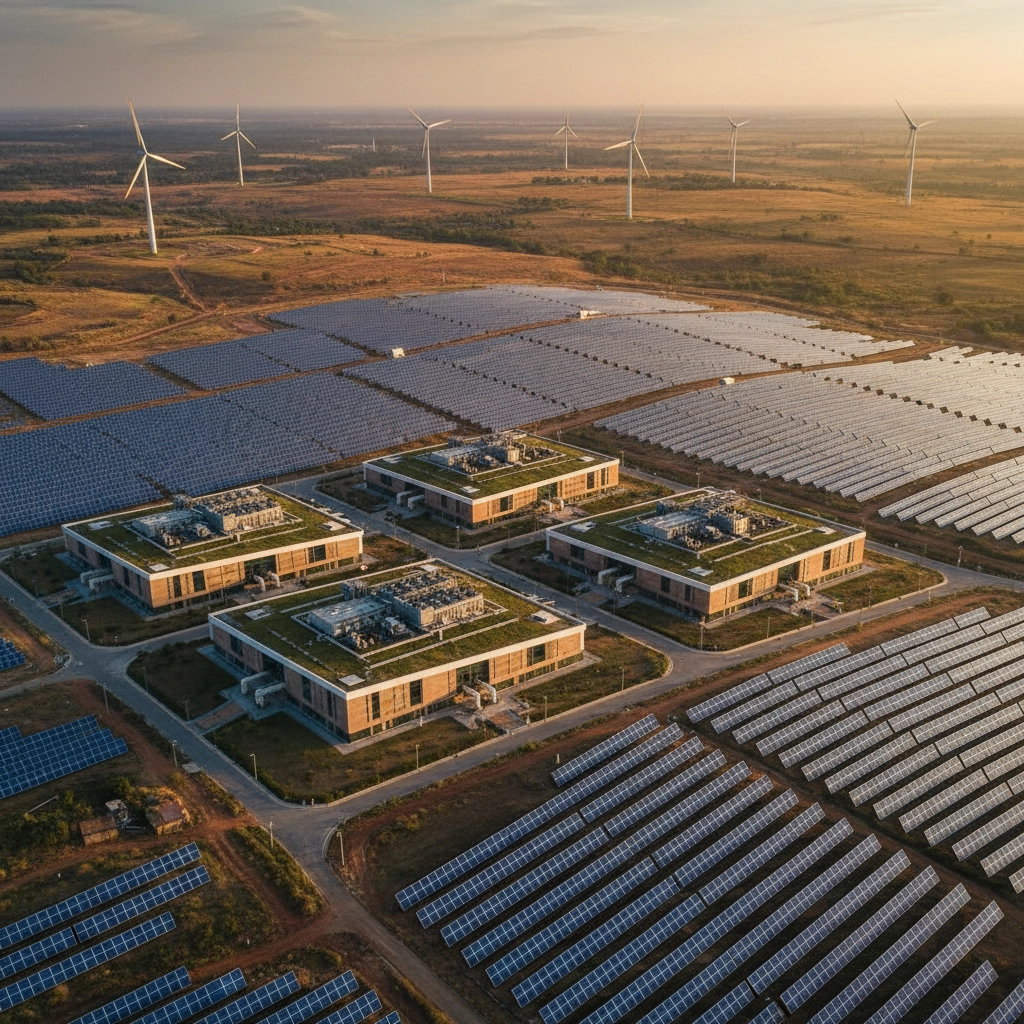India's technology infrastructure is experiencing unprecedented growth that presents extraordinary opportunities for Israeli companies seeking to expand their global footprint. The convergence of massive digital adoption, government initiatives, and growing investment makes India one of the world's most attractive tech markets for international partnerships and expansion.
The Infrastructure Revolution Underway
India's digital transformation is fundamentally reshaping the technology landscape. The datacenter industry has grown by 2.5 times over the last four years at a 24% compound annual growth rate, with the country positioned for a five-fold increase in datacenter capacity by 2028. This explosive growth is driven by 5G services now available in 779 out of 783 districts across the country, widespread cloud adoption, and the rapid emergence of AI applications.
The scale of this transformation is remarkable. By 2024, India had secured more than $60 billion in datacenter investments, with projections indicating this figure could exceed $100 billion by 2027. India's datacenter industry, valued at $10 billion in FY 2023-24, has witnessed 139% capacity growth since 2019, rising from 590 MW to 1.4 GW.

Artificial Intelligence as a Growth Catalyst
Market Potential and Government Support
Artificial Intelligence represents one of the most significant opportunities for Israeli technology companies. The AI industry is projected to contribute $957 billion to India's economy, with the government approving $1.24 billion in investments for AI infrastructure, including at least 10,000 GPUs. India's AI sector is anticipated to contribute around $400 billion to the national economy by 2030.
Infrastructure Requirements
AI workloads, including machine learning and natural language processing, require advanced facilities with enhanced power and cooling capabilities. McKinsey's analysis indicates that AI-ready datacenter capacity will grow at an annual rate of 33% between 2023 and 2030, with significant demand targeting facilities equipped to handle advanced AI workloads.
Strategic Opportunities for Israeli Companies
Mobility and Automotive Technology
Israeli companies are particularly well-positioned to capitalize on India's automotive transformation. Israel hosts over 800 mobility startups that can complement India's manufacturing strength through software-led transformation of vehicles with AI, sensors, and automation. The synergy between Israel's technology innovation and India's manufacturing scale creates compelling partnership opportunities.

Infrastructure Development Collaboration
A significant bilateral opportunity exists through Israel's $200 billion infrastructure investment over the next 10 years, with active efforts to attract Indian companies to compete on international tenders in Israel. This creates reciprocal opportunities for Israeli companies to leverage India's expanded infrastructure capabilities.
Key Market Dynamics and Growth Areas
Geographic Expansion Beyond Tier-1 Cities
While Mumbai and Chennai account for 70% of total installed datacenter capacity, with Mumbai alone representing nearly half the country's IT power capacity, significant opportunities exist in emerging markets. Tier-2 and tier-3 locations such as Ahmedabad, Lucknow, Patna, Pune, Vizag, Cochin, Jaipur, Guwahati, and Kolkata are emerging as critical hubs for edge datacenters.
Investment Landscape
According to NASSCOM, India is expected to attract $5 billion in annual investment in datacenters in 2025 alone. Capital deployment in the datacenter sector totaled $4.2 billion in March 2024, comprising $2.6 billion in equity and $1.6 billion in debt. In the last five years, nearly 440 acres of land have been acquired for hyperscale centers, with Hyderabad leading with 69% of acquisitions.

Sustainability and Future-Readiness
Renewable Energy Integration
India aims to achieve 500 gigawatts of renewable energy by 2030 and over 600 gigawatts by 2032. The country's geographic diversity offers ample scope for renewable integration, particularly solar and wind energy, in powering datacenter facilities. Israeli companies with expertise in renewable energy technologies and efficient cooling systems will find significant opportunities in helping Indian operators optimize Power Usage Effectiveness (PUE).
Green Technology Opportunities
The push towards sustainable infrastructure creates openings for Israeli cleantech companies. India's commitment to carbon neutrality by 2070 means massive investments in green technologies, energy storage solutions, and smart grid systems where Israeli innovation excels.

Strategic Entry Considerations
Technology Transfer and Manufacturing
Many Israeli hardware companies are choosing to manufacture in India due to cost advantages and the desire to scale operations. The combination of Israeli technological innovation with India's manufacturing capabilities creates a compelling value proposition for market entry and expansion.
Government Initiative Alignment
Israeli companies should align their strategies with government programs like Digital India, which promote data localization and boost demand for domestic infrastructure. The bilateral relationship aims to double trade from $5 billion to $10 billion in the next 2-3 years.
Practical Steps for Market Entry
1. Identify the Right Partnerships
Success in India requires local partnerships. Look for established Indian companies with complementary capabilities rather than trying to go it alone. Joint ventures often work better than wholly-owned subsidiaries for technology transfer and market access.
2. Understand Regulatory Landscape
India's regulatory environment is complex but navigable. Key considerations include data localization requirements, foreign direct investment limits in certain sectors, and compliance with evolving cybersecurity frameworks.
3. Leverage Government Programs
Both Israeli and Indian governments offer various incentives for bilateral trade and investment. Programs like India's Production Linked Incentive (PLI) scheme and Israel's export promotion initiatives can significantly reduce entry barriers.

4. Focus on Tier-2 Cities
While Bangalore, Mumbai, and Delhi dominate headlines, enormous opportunities exist in emerging tech hubs like Pune, Hyderabad, Chennai, and Kochi. These markets offer lower costs, growing talent pools, and less competition.
5. Build Long-term Relationships
Indian business culture values long-term relationships over quick wins. Invest time in building trust, understanding local customs, and demonstrating commitment to the Indian market.
Sector-Specific Opportunities
Cybersecurity and Defense Tech
Israel's renowned cybersecurity expertise aligns perfectly with India's growing security needs. The Indian cybersecurity market is expected to reach $35 billion by 2025, driven by digital transformation and increasing cyber threats.
AgriTech and Water Technology
Israel's expertise in agriculture technology and water management addresses critical Indian challenges. The Indian agritech market is projected to reach $24 billion by 2025, with significant government support for modernization.
FinTech Integration
India's digital payments revolution creates opportunities for Israeli fintech companies. With over 40% of global real-time payment transactions happening in India, there's massive scope for innovative payment solutions and financial technologies.
The Path Forward
The convergence of India's massive digital transformation with Israeli technological expertise creates unprecedented opportunities for companies willing to invest in long-term partnerships and local presence. Success requires understanding both the scale of India's infrastructure boom and the specific technological needs driving this growth.
Israeli companies that move quickly to establish meaningful partnerships, align with government initiatives, and build local capabilities will be best positioned to capture the enormous value creation opportunity that India's tech infrastructure boom represents. The bilateral relationship framework, growing investment flows, and complementary technological capabilities create a foundation for sustained success.
The time to act is now. India's tech infrastructure boom is accelerating, and early movers will capture the best opportunities while building sustainable competitive advantages for the decades ahead.




